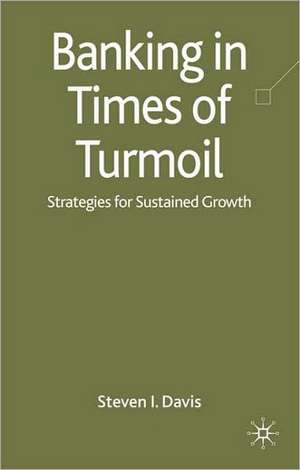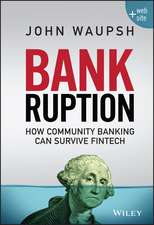Banking in Turmoil: Strategies for Sustainable Growth
Autor S. Davisen Limba Engleză Hardback – 23 sep 2009
Preț: 381.00 lei
Nou
Puncte Express: 572
Preț estimativ în valută:
72.91€ • 75.84$ • 60.19£
72.91€ • 75.84$ • 60.19£
Carte tipărită la comandă
Livrare economică 14-28 aprilie
Preluare comenzi: 021 569.72.76
Specificații
ISBN-13: 9780230235717
ISBN-10: 0230235719
Pagini: 112
Ilustrații: VII, 112 p.
Dimensiuni: 140 x 216 x 13 mm
Greutate: 0.25 kg
Ediția:2009
Editura: Palgrave Macmillan UK
Colecția Palgrave Macmillan
Locul publicării:London, United Kingdom
ISBN-10: 0230235719
Pagini: 112
Ilustrații: VII, 112 p.
Dimensiuni: 140 x 216 x 13 mm
Greutate: 0.25 kg
Ediția:2009
Editura: Palgrave Macmillan UK
Colecția Palgrave Macmillan
Locul publicării:London, United Kingdom
Cuprins
List of Figures List of Institutions Interviewed Preface Introduction From Sub-prime to Quasi-nationalization: What Actually Happened in 2007-2008 Generic Lessons from the Turmoil: What Have We Learned for Future Reference? The Lessons for Future Risk Management Business Models: How Might They Evolve The Role of Leadership and Culture Projecting Past Experience: How Might Bank Profitability and Returns Evolve? Case Studies of Successful Business Models Outlook for the Future and Unresolved Issues Bibliography
Recenzii
'In the light of what is probably the most serious global banking crisis ever, Steve Davis's book could not be better timed. The crisis is likely to be transformational in the world of banking and the author brings to the analysis the unique perspective of a bank consultant close to many of the world's leading banks and bankers. In a typically masterful manner, the book outlines the many general lessons to be learned most especially with respect to risk management, how business models of banks might evolve as a result of the crisis, and the role of culture and leadership. It also considers the outlook for the future. The book is based on extensive and frank interviews with leading bankers, their consultants, banking analysts, rating agencies and bank regulators around the world together with eight excellent case studies of successful business models, giving the reader unique insights. This extremely readable book is essential reading for those who look for a very practical analysis of the crisis and its implications for future bank strategy.'
- David T Llewellyn, Loughborough University, CASS Business School,& the Vienna University of Economics and Business Administration.
'A provocative discussion of what the banking landscape might look like after the crisis and practical advice for meeting the growing demands of customers, staff, investors and politicians. If banks are looking for a guide on how to restructure for the future, this is it.'
- SirBrian Pitman, Former Chairman, Lloyds Bank Group.
'Steve Davis thoroughly investigates the many components that led to the near meltdown of the system, and makes suggestions on how we must modify many of the rules which had become truisms for the current banking generations. The current banking crisis is so recent that there is still debate on what went wrong and why, but Steve's book is a professional and thoughtful look into many of the key issues bankers now face, and I have no hesitation in commending it.'
- Robin Monro-Davies, former CEO of Fitch Ratings
- David T Llewellyn, Loughborough University, CASS Business School,& the Vienna University of Economics and Business Administration.
'A provocative discussion of what the banking landscape might look like after the crisis and practical advice for meeting the growing demands of customers, staff, investors and politicians. If banks are looking for a guide on how to restructure for the future, this is it.'
- SirBrian Pitman, Former Chairman, Lloyds Bank Group.
'Steve Davis thoroughly investigates the many components that led to the near meltdown of the system, and makes suggestions on how we must modify many of the rules which had become truisms for the current banking generations. The current banking crisis is so recent that there is still debate on what went wrong and why, but Steve's book is a professional and thoughtful look into many of the key issues bankers now face, and I have no hesitation in commending it.'
- Robin Monro-Davies, former CEO of Fitch Ratings
Notă biografică
STEVEN DAVIS has spent his career in banking as a senior practitioner, strategy consultant, author, lecturer and coach. This is his 14th book on best practice in bank management. Previous titles include: Leadership in Financial Services, Leadership in Conflict, The Management of International Banks, Bank Mergers, Excellence in Banking, Managing Change in the Excellent Banks, Excellence in Banking Revisited! and Investment Banking.


















